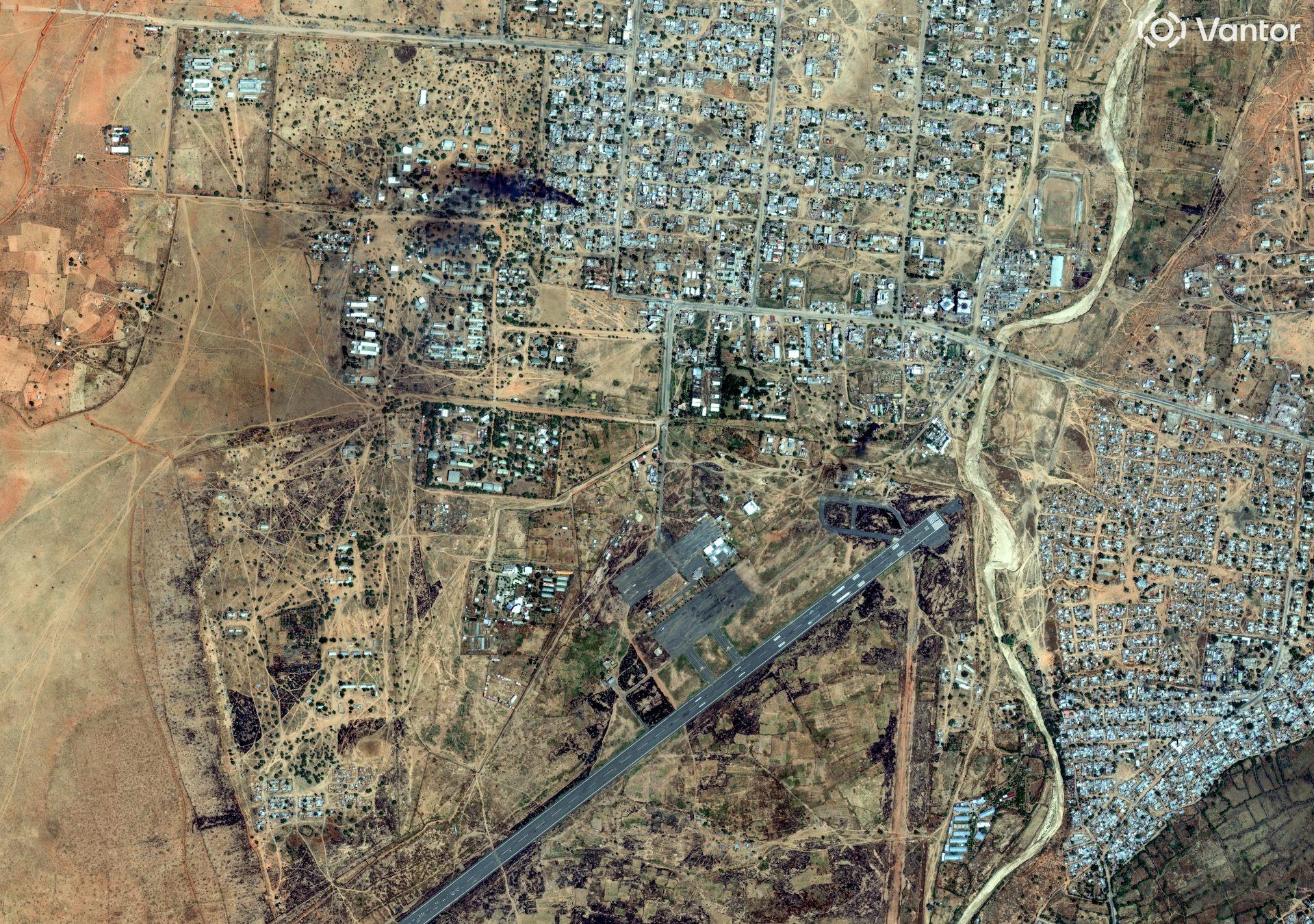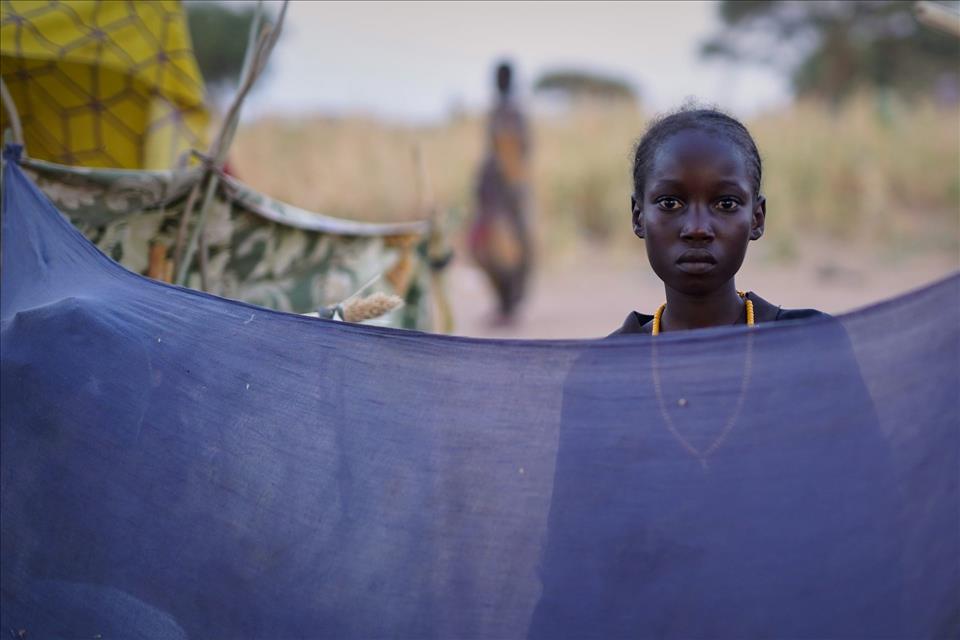
Can The World Prevent A Genocide In Sudan?
Last week, the Rapid Support Forces (RSF), the paramilitary group battling Sudan's army, captured the city of El Fasher, the last hold-out in the western Darfur region held by the military.
Soon after, reports of ethnically motivated massacres emerged. The World Health Organization said 460 people were killed in just one incident at the city's hospital. Witnesses described widespread executions and sexual violence targeting certain ethnic groups.

A handout satellite image made available by Vantor shows fires and smoke around El Fasher Airport on October 26 after the Rapid Support Forces (RSF) took over the city and surrounding villages. Vantor handout/EPA
A UN fact-finding mission found already last year that both sides in the conflict have committed war crimes and crimes against humanity.
Rights groups and analysts are now sounding the alarm about a possible genocide taking place. Some say the killings are reminiscent of the start of the Rwanda genocide in 1994, which killed a staggering 800,000 people.
The atrocities are also following the same troubling pattern as in Darfur 20 years ago, which killed an estimated 300,000 people.
Back then, celebrity activists such as George Clooney helped put Darfur on the map. It became a major foreign policy issue in the United States, Europe, Africa and elsewhere. The genocide in Rwanda was still relatively fresh in people's minds. The slogan“never again” was still taken somewhat seriously.
The global attention eventually led the International Criminal Court to indict Sudanese President Omar al-Bashir for allegedly directing the campaign of mass killings in Darfur, the first sitting head of state to be indicted.
Sudan is now home to the worst humanitarian crisis in the world. Hundreds of thousands have been killed since 2023, 12 million people have been displaced and 21 million people face what the UN calls“high levels of acute food insecurity”.
Yet, compared to the early 2000s, the international community has been largely silent.
Why global attention mattersIt would be tempting to say the wars and suffering in Gaza and Ukraine have overshadowed Sudan in the minds of global leaders and concerned citizens alike. But this does not mean the world can't do anything.
Global awareness did not solve anything by itself in Darfur 20 years ago, but it was a first step. It led to the eventual deployment of a peacekeeping mission by the United Nations and the African Union.
Demonstrators urging an end to the violence in Darfur outside Downing Street in central London in April 2007. Andy Rain/EPA
The mission was too small and limited, but it showed that international peacekeepers can still have a positive impact in the 21st century. They can monitor ceasefires, implement disarmament programs, protect civilians and prevent further escalations of violence.
More attention – and pressure – also needs to be placed on the external actors supporting both sides in the current conflict. These countries are pursuing their own strategic interests in Sudan and consider the power struggle a chance to increase their influence in the region and exert control over Sudan's natural resources.
The Sudanese Armed Forces (SAF) are backed by Egypt, Turkey, Iran and Russia. The United Arab Emirates, meanwhile, has been accused of funding and providing weapons to the Rapid Support Forces in clear violation of an arms embargo.
While these countries deny arming both sides, rights groups say a flood of weapons has nonetheless entered the country. The United Arab Emirates, in particular, is accused of covertly supplying drones, howitzers, heavy machine guns and mortars to RSF fighters in Darfur.
The United Arab Emirates has only just started to distance itself from the RSF following the recent atrocities in El Fasher.
What's needed to bring peaceA ceasefire must urgently be agreed to, so humanitarian corridors can be opened to allow aid organisations to do their work.
All outside military support to the warring parties must end immediately. The current arms embargo is too limited and has been poorly implemented – it needs to be strengthened.
And more sanctions should be imposed, especially on the perpetrators reportedly responsible for international crimes. In January, the Biden administration levied sanctions on the RSF commander and several UAE-based companies supporting him – these must now be expanded.
This would make it more difficult for Sudan's lucrative gold trade to continue to be used by both sides to sustain the war.
For the peace to hold in the long term, both sides must also agree on a mechanism to disarm or integrate the RSF fighters into the regular forces.
Soldiers from the Rapid Support Forces patrol in northern Sudan in 2019. AP
Establishing some form of justice and reconciliation process can also contribute to preventing further violence. This sends a clear signal that committing crimes will not be rewarded. It can also help communities heal and give peace a better chance.
Nothing of this sort has really happened in Darfur over the past couple decades. Instead, political actors continued to exploit and aggravate ethnic tensions. The RSF, in particular, has recruited fighters from the infamous Janjaweed militias responsible for the Darfur atrocities in the early 2000s.
A further complication is the increasing fragmentation of the situation, as the Sudanese Armed Forces and RSF are not perfectly integrated armies. They do not have centralised control over their various coalitions of fighters.
This means that while getting the leaders to agree on a ceasefire is important, it may not be sufficient.
As a result, peace initiatives must include local agreements with individual rebel leaders and smaller factions of fighters, which can greatly increase the security of the population in particular areas.
To be clear, lasting peace does not come from some miracle peacemaker. In fact, nothing tangible came out of previous attempts at peace talks aimed at ending the conflict this year.
But this is where other actors can play an important role. The United Arab Emirates, for example, may now feel pressured to exert a more positive influence on the RSF and urge it to come to the negotiating table. The same applies to Egypt and the Sudanese Armed Forces.
And a more comprehensive plan then needs to be worked out, ideally through an international organisation like the United Nations or the African Union, with the goal of empowering the people of Sudan to make their own political decisions.
Sudan is a stark reminder that making lasting peace takes huge efforts. The devastating situation in the country demands the world keep trying.

Legal Disclaimer:
MENAFN provides the
information “as is” without warranty of any kind. We do not accept
any responsibility or liability for the accuracy, content, images,
videos, licenses, completeness, legality, or reliability of the information
contained in this article. If you have any complaints or copyright
issues related to this article, kindly contact the provider above.


















Comments
No comment